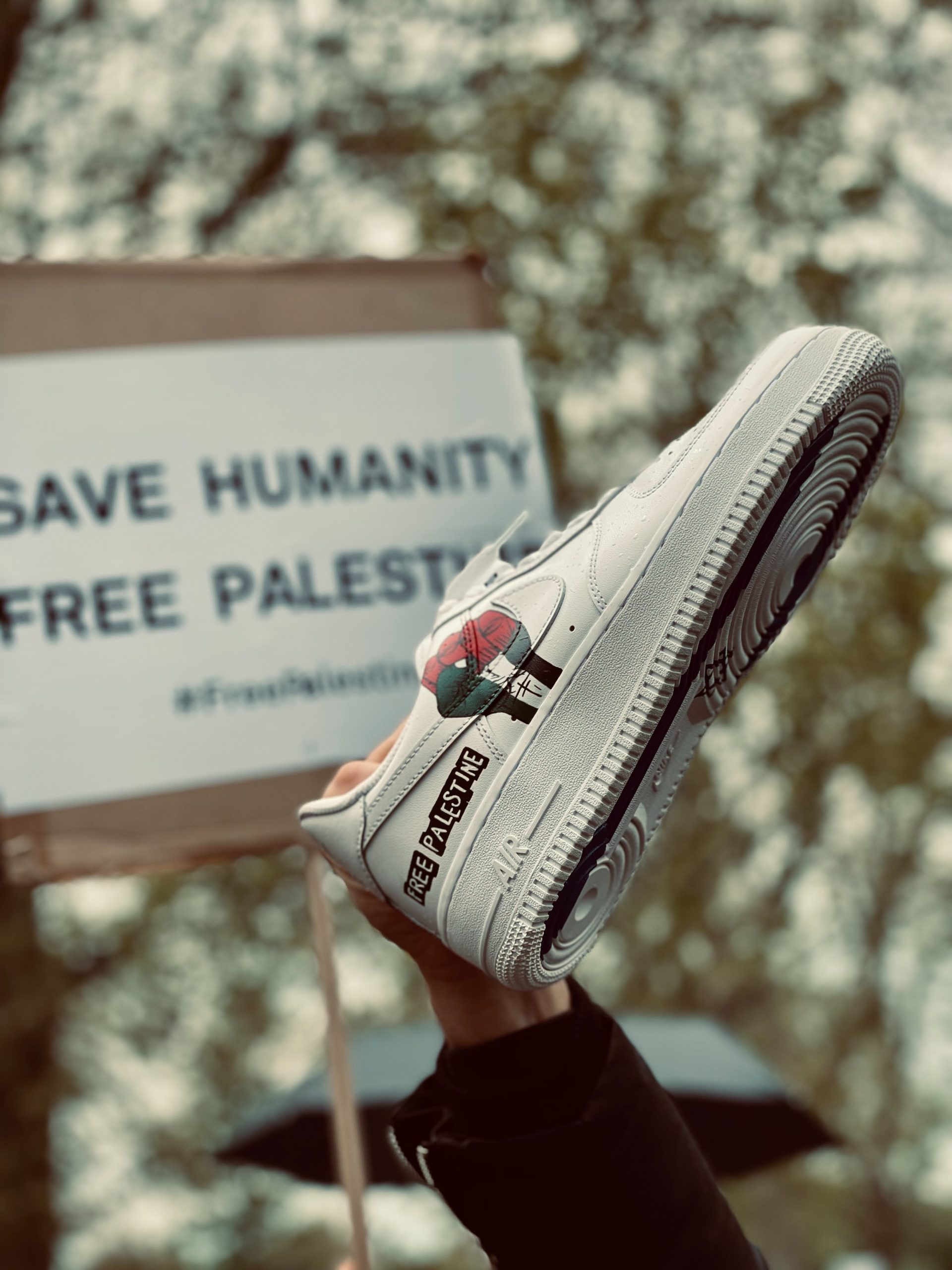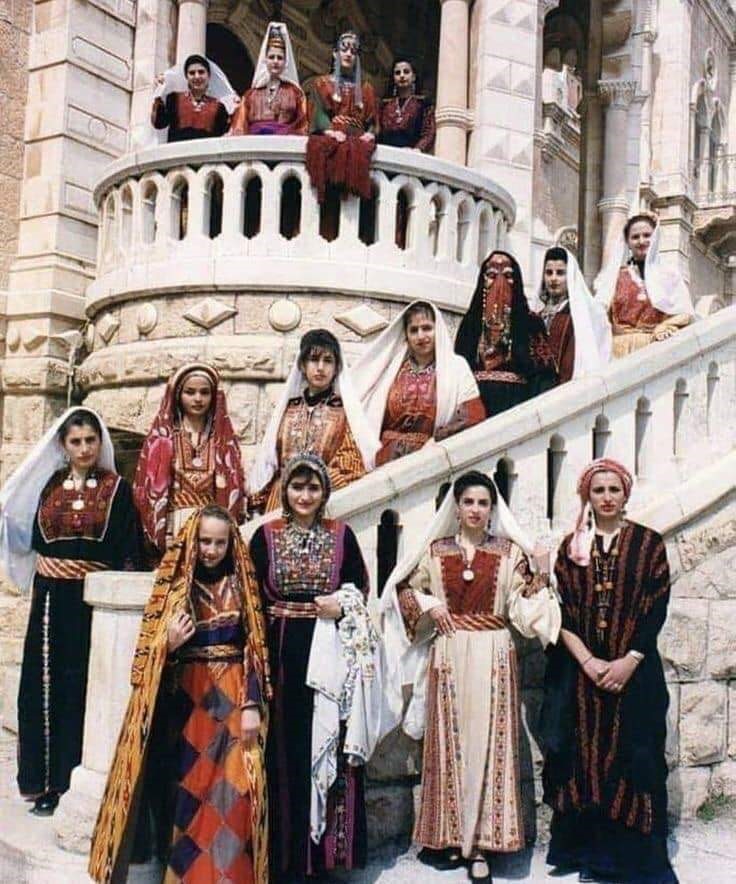The Heartbreaking Reality of Palestinian Children in the Shadows of Conflict
In a deteriorating neighbourhood in Palestine, a 6-year-old girl named Hala sits cross-legged on the cold floor of her humble home, her little fingers clutching a crayon as she colours with an intensity that belies her years. Her world is simple, contained within the lines of the picture before her—a house with a beautiful garden, a big family, and a bright yellow sun. But as she reaches for the sun, her hand pauses mid-air; her yellow crayon is missing.
With furrowed brows, Hala scampers towards her father, hoping he might know where her crayon lies. She finds him in the dim light of the next room, her baby brother cradled in his arms, a yellow crayon in his hand. Her father, with a seriousness that reaches the depths of his eyes, is writing something on her brother’s tiny calf. Hala giggles, finding the sight amusing and odd. Why would Baba be writing on baby Kareem?
Her father looks up and beckons her closer with a tender smile that doesn’t quite reach his weary eyes. “Come here, my little flower,” he says, and gently, he takes her leg and writes her name on her calf. Hala watches, puzzled but trusting, as her father explains, “So that all the different angels know your name.” They sit down for breakfast, a meal prepared by her father, who tries his best to fill the void left by her mother, now living in Paradise.
Hala thinks her father’s food is delicious, but there’s a big part of her that consistently aches for the taste of her mother’s cooking and for the warmth of her embrace.
As they eat, her father tells them there will be no school today. Hala’s heart sinks a little; she misses her friends, her teachers, and the normalcy of her lessons. But before she can express her disappointment, the world erupts into chaos.
An airstrike shatters the morning calm, the house shakes, and the air fills with the sound of explosions. Her father’s arms are suddenly around her now, as are Kareem’s, pulling them away from the windows, away from the danger. Hala’s heart pounds in her chest, and her ears ring with the sound of her father’s voice, urgent and scared, telling her to hide and not come out until he says so.
She hides, trembling, from the noise outside, a terrifying cacophony of screams, blasts, and destruction. Time stretches on, with each second an eternity of fear. Then silence falls.
A scream pierces the stillness—this time, her father’s scream. Hala’s heart stops, then races, tears pouring down her cheeks because of the way her father sounded. She runs towards the sound, towards the pile of rubble that was once part of her home. And there, amidst the dust and the debris, she sees it—a small leg with a name written on the calf.
Kareem.
In that moment, Hala now fully understands her father’s morning ritual. The names on their legs were not for the angels but for a father who might have to identify his children in the aftermath of a nightmare. The reality of her world crashes into her with a force that steals her breath. Her crayons, her pictures, her childhood—all overshadowed by the cruel, unyielding truth of it all.
This story is an example of a heartbreakingly common reality for Palestinian children and their families. It is an example of the innocence lost, the pain endured, and the constant, unmatched strength needed to navigate the landscape of this conflict. It’s a call to the world to bear witness to what is happening and to act so that Palestinian children can colour in their suns without fear and parents like hers don’t have to take such terrifying precautions against what is humanely unthinkable.
Because there is a purity in the way children view the world, an inherent belief in the goodness of life, even when faced with circumstances that challenge the very essence of their youth. The youngest hearts carry voices that consistently yearn for basic safety and peace.
In the simplicity of their words and the depth of their sentiments, we may find a reflection of our shared humanity. We are witnessing a world where the innocent laughter of children is drowned out by the deafening sounds of explosions, where schools are replaced by detention centres, and playgrounds morph into battlefields. This is the reality for Palestinian children, whose lives are ensnared in an offence they played no part in creating.
This is an immense crisis, one that has persisted for decades yet often escaped the global spotlight. Palestine is today one of the most prolonged conflicts of our time. The recognition of these children has remained in the shadows for too long.
Their existence is not marked by the playful carefreeness of youth but by explosions, destruction, and the shackles of fear. And the raw suffering is real—since 2005, the skies of Gaza have been scarred by six major military offensives, snatching away the lives of thousands of children.
Imagine the terror of a child in the West Bank, where a walk to school can turn into a nightmare and where military incursions shatter the silence of the night. These children have unnaturally learned to distinguish between the roar of a fighter jet and the whistle of a drone. Schools themselves also became targets during military offensives. The education system had been stretched thin, with schools operating in double or triple shifts.
The population of Gaza is one of the youngest in the world, with nearly half being under 18 years old, with some barely old enough to understand the world around them. Yet they have witnessed atrocities and devastation that no child should ever experience.
Many children, as young as eight years old, face detention and prosecution in a military court system that lacks legal protection. In 2023 alone, an average of 170 children found themselves in military detention each month, their young lives disrupted by a system that treats them as adults. The situation is dire, with children being detained for hundreds of days. Children as young as eight years old are often plucked from their beds at night, blindfolded, and handcuffed.
The mistreatment extends to physical and verbal abuse, with children held in unsanitary conditions and often forced into signing confessions they can’t read. One chilling story shared by Defence for Children in Palestine tells of children who were used as a human shield. A child was made to stand in front of the Israeli military’s vehicle in order for them to avoid being shot themselves (titled: Israeli forces use five Palestinian children as human shields, dci-palestine.org).
The Unfolding Tragedy in Gaza Amidst Blockades, Abductions, and Unbearable Loss
There are currently over one million new displacements in Gaza. And the abduction of children, a violation of international humanitarian law, adds another layer of terror to an already unbearable situation.
But the reality of the situation continues to worsen. The Israeli blockade has choked the region, turning it into a virtual open-air prison. Basic necessities like electricity, clean water, and medical supplies are in chronic shortage, making every day a struggle for survival. Over 4,000 Palestinian children have been killed in Gaza since October, and more than 1000 children are missing. In just a 24-hour period, over 300 Palestinian children were killed due to Israeli bombardment. The physical and emotional consequences are untold, with children also being blinded by live ammunition and stun grenades. The violence and uncertainty that fill their lives leave them with deep emotional scars and an understanding of extreme loss that they should not be facing.
The Unbroken Spirit of Palestinian Children in the Face of Unthinkable Loss and the Call to Action for a Future of Hope
These statistics represent unthinkable pain, broken families, and a generation that knows more about war than peace. These children, forced to grow up too quickly, bear the weight of a conflict that has stolen their right to a childhood. Their eyes, far too mature for their age, reflect a number of traumas, from losing loved ones who took care of them to having their homes crumble around them, from enduring injuries that leave lifelong scars to facing the debilitating fear of what horrors might happen next. The constant hum of drones and the sudden bursts of gunfire have become constant yet remain terrifying.
They constantly show signs of severe emotional distress. They are navigating a nightmare come true, where the right to a safe and happy childhood is a luxury out of reach. Instead of schools, they attend funerals; instead of playgrounds, they navigate through rubble. The psychological impact is profound, leading to conditions like severe post-traumatic stress disorder (PTSD), anxiety, and depression, which also go untreated.
And yet these children, despite the violence and loss they have experienced, still hold onto hope. They continue to dream of a future where they can play freely, where they are not going to sleep hungry, where those left in their families are safe from harm, and where they can live without fear. They aspire to become doctors, teachers, and artists; their ambitions are fuelled by a desire to rebuild and contribute. These children constantly remind us of our shared responsibility to stand up against injustice. They prove that peace is not an exception but a birthright.
As we bear witness to the unyielding hope of the Palestinians, let us advocate for their rights and strive for a future where their laughter triumphs over tears. Their dreams and futures are at stake. Let us act now, for the sake of humanity.
“They continue to find hope in despair and light in the darkness. They are the dreamers, the believers, and the future. And they cannot be silenced.”



If you would like to donate to the crisis in Gaza, please make use of these well-known platforms below.
United Nations Relief: https://www.unrwa.org
United Nations Population Fund: https://www.unfpa.org
Islamic Relief: https://islamic-relief.org
Al Imdaad Foundation: https://www.alimdaad.com
For further information regarding the crisis:
Save The Children: https://www.savethechildren.net
Defence for Children in Palestine: https://dci-palestine.org
+972 Magazine: https://www.972mag.com
Al Jazeera: https://www.aljazeera.com
United Nations Relief: https://www.unrwa.org
UNICEF: https://www.unicef.org, and
OCHA: https://www.unocha.org.
Join the Bold Club for VIP access to exclusive events, unique networking opportunities, and special promotions across the city. Sign up to be on our waiting list and elevate your experiences with us.

